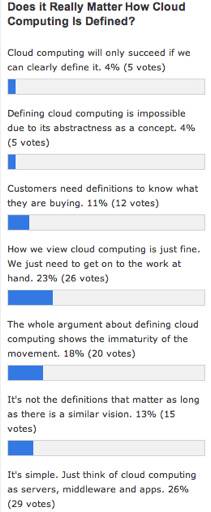In our poll last week, we asked: “Does it Really Matter How Cloud Computing Is Defined?” This week, we want to know: “Is Oracle a cloud company?” The questions have some relationship as how we defien cloud computing has some impact on the way we view a company and its overall vision.

As for the overall debate, most of our respondents to last week’s question agreed with the RedMonk team on this one. The number one response :
“It’s simple. Just think of cloud computing as servers, middleware and apps.”
The interest in this topic is shifting. About 100 or so people responded to the poll, compared to past polls that have had more than 1,000 votes. Maybe the more legitimate question should be: ” Does it NOT matter at all how cloud computing is defined?”
The reality: Cloud computing gets enough attention that relevant information about a particular interest is readily available to understand the basics. There is still plenty of demand for information about cloud computing. We’d say far so more than how to define it. That view is reflected in our poll. People want to get on to the work at hand.

Still. the question elicited a number of comments on our post, looking deeper at the intrinsic aspects of how we view the abstract nature of what cloud computing really means. Sam Johnston offered a definition developed by some fellow Wikipedians. From our post:
“Virtualisation is also not intrinsically linked with cloud – you don’t see cloud providers like Facebook, Google & Twitter using it. Most of the noise about virtualisation is (unsurprisingly) coming from vendors selling virtualisation hardware and/or software.
It’s also important to include products above (e.g. Android, ChromeOS, CloudPlug, etc.) and below (e.g. Cisco UCS, 3tera, VMware vCloud, SGI CloudRack etc.) the well accepted 3-layer stack if we’re to have a functional taxonomy – that is, one capable of classifying all the items in scope – without polluting the top (application) and bottom (infrastructure) layers respectively. That’s why I now use a 5 layer stack to explain cloud computing:http://en.wikipedia.org/wiki/File:Cloud_Computing_Stack.svg In answer to your question about definitions, I think it is important and have spent the last few years trying to get to the bottom of it. This is the best I’ve been able to come up with so far (with the help of some fellow Wikipedians):`Cloud computing is Internet-based computing, whereby shared resources, software and information are provided to computers and other devices on-demand, like a public utility. ‘ “
This week our attention turns to Oracle: “Is Oracle a Cloud company”” It’s a fitting question in some respects, considering what we explored last week and the unclear message coming from Oracle.
Oracle will release a re-engineered version of Fusion in the second-half of 2010 as a hybrid platform, available on-premise and in the cloud. Information Week pulled this quote from Larry Ellison’s call last week to report Oracle’s quarterly results:
“So we’ll be delivering those applications both by selling the software directly, kinda the old way of doing it, which is still the most popular, by the way; we’ll be selling the Fusion applications integrated with our hardware–our servers and our storage and our networks; and we’ll be selling it on the cloud.” He later added, “our cloud or somebody else’s”.
So the question is out there. Where does Oracle stand? Is it a cloud computing company?

















